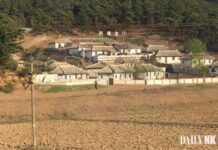With North Korean schools unprecedentedly holding their year-end exams in February due to the COVID-19 pandemic, the adoption of at-home testing in some border regions under lockdown in Yanggang and Chagang provinces has reportedly led to incidents of cheating.
According to Daily NK sources in Yanggang and Chagang provinces, students in Hyesan and Samjiyon in Yanggang Province and Chasong and Manpo in Chagang Province took their year-end exams at home after authorities placed those towns under lockdown due to incidents involving defections and smuggling.
Daily NK previously reported that universities, middle and high schools and elementary schools nationwide began year-end exams from Feb. 1 in accordance with an order from the education ministry.
However, with lockdowns ordered once again for certain border regions in Yanggang and Chagang provinces, students in those areas took their exams at home rather than in separate testing venues. According to the source, with local residents strictly forbidden from leaving their homes, students had to take their exams at their own homes individually.
Authorities locked down Hyesan and Samjiyon, Yanggang Province, on Jan. 29 after locals were caught smuggling seasonings, sugar and soybean oil. The lockdown was lifted on Monday.
Meanwhile, authorities locked down Chasong and Manpo, Chagang Province on Feb. 3 in response to cases of defections and smuggling. Those towns remain under lockdown.
“Due to the lockdown order, students were unable to go to school and had to take year-end exams at home,” said a source in Chagang Province. “[The exams] were carried out with teachers directly bringing exam papers to students’ homes.”

In fact, students in the locked-down regions took the exam sitting one-on-one with teachers visiting their homes as proctors. However, cheating reportedly took place with teachers receiving money to provide students – usually university students – with answers as they took the exam.
A source in Yanggang Province said teachers made money by offering to provide answers for cash. “They take 100 dollars to provide all the answers and 70 dollars to provide about 70% of the answers,” he said. “But since you can’t really use dollars now, they calculated it in national [North Korean] money.”
Unlike students at elementary, middle and high schools, university students can flunk out if they receive poor year-end exam scores, and in particular, their scores in major requirements are important to their social entry and development. Accordingly, said the source, teachers seize on this to openly demand money.
The source added that families without the wherewithal to bribe teachers worry that their children might suffer as a result.
Meanwhile, vacation began immediately after the 10-day year-end exam period ended. There are reportedly no particular orders as of yet regarding the reopening of schools in March.
“Like before, even if they say schools will open on March 1, it’s likely [the semester] will proceed with students not actually going to school,” said the source in Yanggang Province. “It seems [authorities] have judged that in-school learning will be possible after inoculating people with vaccines received [through international bodies] and seeing how things are.”
















